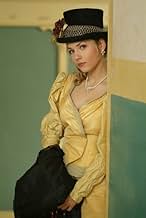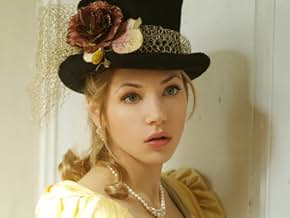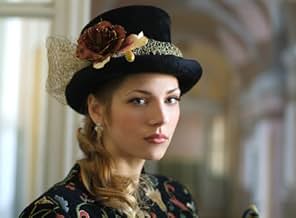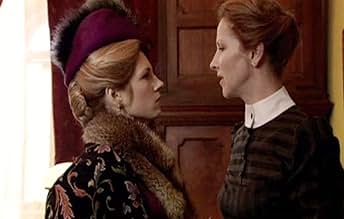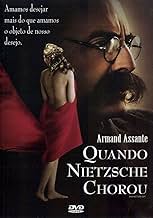IMDb-BEWERTUNG
6,4/10
5107
IHRE BEWERTUNG
Füge eine Handlung in deiner Sprache hinzuViennese doctor Josef Breuer meets with philosopher Friedrich Nietzsche to help him deal with his despair.Viennese doctor Josef Breuer meets with philosopher Friedrich Nietzsche to help him deal with his despair.Viennese doctor Josef Breuer meets with philosopher Friedrich Nietzsche to help him deal with his despair.
- Regie
- Drehbuch
- Hauptbesetzung
Michal Yannai
- Bertha
- (as Michal Yanai)
Ayana Haviv
- Singer - 'Hymnus an den leben'
- (Nicht genannt)
Empfohlene Bewertungen
Fine production values, a dry sense of humor throughout, literate script, decent casting (Assante transcends his usual "heroics" and plays a crumbling soul nicely and Cross is always workmanlike and solid), and, slyly, the film (as the book did) finally gives Nietzsche credit for inventing modern psychoanalysis (since Freud, et al, in the field stole from his works outrageously and lavishly, without assigning him the proper credit for his startlingly original insights into the world-historical human, all too human capacity for self-deception).
A tough work for an adaptation, but this movie succeeds where something like "Freud" dismally collapsed into timid clichés.
Nietzsche would have gotten many a devilish laugh out of this work's visual craftiness.
And appreciated being treated, not as a cartoon "Overman" idol, but a struggling, flawed, tragic-comically-profound human.
"Ecce Homo", his anti-"autobiography" warned those who followed not to take him too seriously.
If this film stimulates a few people to pick up his "Joyful Wisdom" (La Gaya Scienza) or "Dawn", it will have made its honorable point.
Yalom was, in essence, giving Nietszche a posthumous brother's embrace for his loneliness and struggle and brilliance and scorn and lack of recognition while he lived.
This movie does the same.
To a guy, who, friendless and abandoned and ignored through much of his writing life, still affirmed the Universe and humanity in the words:
"Man would rather have the Void for a purpose than be void of purpose." -F.N.
Worth a viewing.
A tough work for an adaptation, but this movie succeeds where something like "Freud" dismally collapsed into timid clichés.
Nietzsche would have gotten many a devilish laugh out of this work's visual craftiness.
And appreciated being treated, not as a cartoon "Overman" idol, but a struggling, flawed, tragic-comically-profound human.
"Ecce Homo", his anti-"autobiography" warned those who followed not to take him too seriously.
If this film stimulates a few people to pick up his "Joyful Wisdom" (La Gaya Scienza) or "Dawn", it will have made its honorable point.
Yalom was, in essence, giving Nietszche a posthumous brother's embrace for his loneliness and struggle and brilliance and scorn and lack of recognition while he lived.
This movie does the same.
To a guy, who, friendless and abandoned and ignored through much of his writing life, still affirmed the Universe and humanity in the words:
"Man would rather have the Void for a purpose than be void of purpose." -F.N.
Worth a viewing.
Its not a tremendous film, a must see, of a picture at his own, When Nitszche Wept is very good driven style of fan fiction, that manage to get us near to a lot of Niche, and Freud, concepts -but in reality is only near, because as lots of book-film adaptations, it takes a to much of the director's point of view-, it gets it right in some moments and is not a waste of time at all, but it suffers from his flaws, the nature of art, is specific to each category it belongs, this is most like and homage, and want us to remember very important things, and don't care about being very technical with the acting, the passing, or the writing itself, it's made great with the cameos that it have, and the good vibe the producers have toward those beautiful mind that they were, but maybe fails, to stand alone as film,
Josef Breuer and Sigmund Freud did work together and they did collaborate on a book about Anna O, who was most likely Bertha. Lou Salome did have relationships with Nietzsche and Freud and many others. All of these things are true.
But, Breuer did not treat Nietzsche. That is in the author's (Irvin D. Yalom) imagination, and what a great imagination it was. The story makes a super philosopher seem human, with frailties that we all suffer. It also makes for an interesting story of how psychoanalysis came about. I can imagine that it really did develop this way as Breuer and Feud discovered what worked and what didn't. We see free association or "chimney sweeping" as Bertha called it, we certainly see transference, and much more as the discipline developed.
Ben Cross was excellent, Armand Assante gave the best performance I have ever seen from him, Jamie Elman let us see Feud as a young man, Katheryn Winnick certainly makes me want to see her again, and Michal Yannai was delightful.
A great period piece that will delight all who care about philosophy and psychology.
But, Breuer did not treat Nietzsche. That is in the author's (Irvin D. Yalom) imagination, and what a great imagination it was. The story makes a super philosopher seem human, with frailties that we all suffer. It also makes for an interesting story of how psychoanalysis came about. I can imagine that it really did develop this way as Breuer and Feud discovered what worked and what didn't. We see free association or "chimney sweeping" as Bertha called it, we certainly see transference, and much more as the discipline developed.
Ben Cross was excellent, Armand Assante gave the best performance I have ever seen from him, Jamie Elman let us see Feud as a young man, Katheryn Winnick certainly makes me want to see her again, and Michal Yannai was delightful.
A great period piece that will delight all who care about philosophy and psychology.
I read the book several years ago, and didn't remember much of it, beyond being fascinated by the psychological-philosophical explorations of the legendary characters and intrigued by the migraine issues that Nietszche and Breuer attempt to solve. But the book is deeply intellectual, and it was difficult to imagine it translated to the screen. Unfortunately, the director's interpretation falls very limp indeed, despite valiant attempts by a cast of worthy actors.
Melodrama substitutes in most scenes for subtlety and quiet depth. Two-dimensional beauty in the female characters substitutes for the much harder to convey inner beauty.
I found the heavy-handed artificial accents maintained by all to be especially distracting, if not constantly irritating -- the thick German/Austrian/Russian accents were like bad scenery pulling the focus from any authentic expression of the characters. The wisdom of Nietszche is disappointingly obscured in this mediocre effort.
"And if you gaze for long into an abyss, the abyss gazes also into you."
Melodrama substitutes in most scenes for subtlety and quiet depth. Two-dimensional beauty in the female characters substitutes for the much harder to convey inner beauty.
I found the heavy-handed artificial accents maintained by all to be especially distracting, if not constantly irritating -- the thick German/Austrian/Russian accents were like bad scenery pulling the focus from any authentic expression of the characters. The wisdom of Nietszche is disappointingly obscured in this mediocre effort.
"And if you gaze for long into an abyss, the abyss gazes also into you."
The first thing to make you judge well is that you know this movie is built on a fiction novel just like "The last temptation of Christ", so it's not real and not meant to say anything about the real Freud or Bruer or Nietzsche themselves.
you just have to fall deep into this good story and be sure it's a very touching one, as you know how a very strong man can cry over a moment, one moment.... nothing like you ever can expect.
I found the dreams amazingly directed as you know most directors make silly dream scenes, and the music also was just a very wise pick since nothing made but just picked from known and famous classics, that made it closer to the ear.
i suggest it as a-must-see movie
you just have to fall deep into this good story and be sure it's a very touching one, as you know how a very strong man can cry over a moment, one moment.... nothing like you ever can expect.
I found the dreams amazingly directed as you know most directors make silly dream scenes, and the music also was just a very wise pick since nothing made but just picked from known and famous classics, that made it closer to the ear.
i suggest it as a-must-see movie
Wusstest du schon
- Zitate
Josef Breuer: How could I have given up everything?
Nietzsche: You'd given up everything long before you met me.
Josef Breuer: Yes, but now I have nothing.
Nietzsche: Nothing *is* everything. In order to grow strong, you must first sink your roots deep into nothingness. Learn to face your loneliest loneliness.
Top-Auswahl
Melde dich zum Bewerten an und greife auf die Watchlist für personalisierte Empfehlungen zu.
- How long is When Nietzsche Wept?Powered by Alexa
Details
- Erscheinungsdatum
- Herkunftsland
- Offizielle Standorte
- Sprache
- Auch bekannt als
- Und Nietzsche weinte
- Drehorte
- Produktionsfirma
- Weitere beteiligte Unternehmen bei IMDbPro anzeigen
- Laufzeit
- 1 Std. 45 Min.(105 min)
- Farbe
- Sound-Mix
- Seitenverhältnis
- 1.85 : 1
Zu dieser Seite beitragen
Bearbeitung vorschlagen oder fehlenden Inhalt hinzufügen


